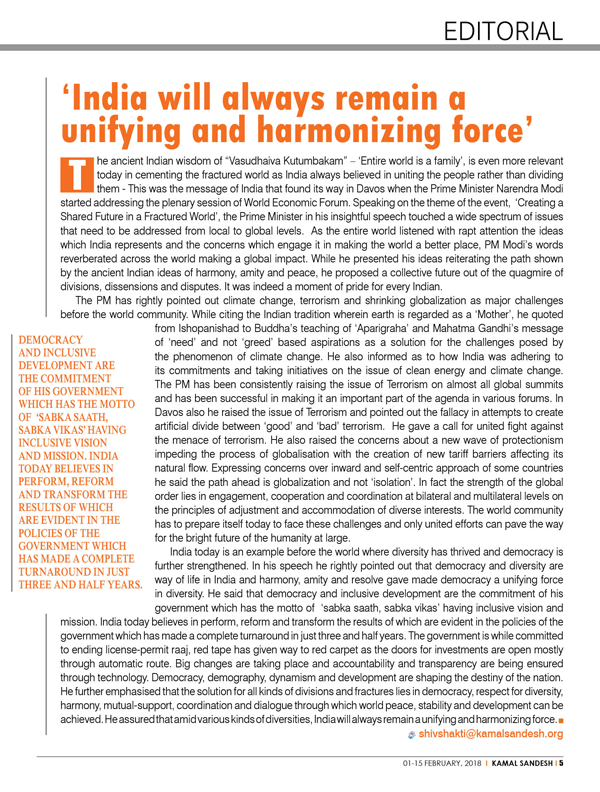The ancient Indian wisdom of “Vasudhaiva Kutumbakam” – ‘Entire world is a family’, is even more relevant today in cementing the fractured world as India always believed in uniting the people rather than dividing them – This was the message of India that found its way in Davos when the Prime Minister Narendra Modi started addressing the plenary session of World Economic Forum. Speaking on the theme of the event, ‘Creating a Shared Future in a Fractured World’, the Prime Minister in his insightful speech touched a wide spectrum of issues that need to be addressed from local to global levels. As the entire world listened with rapt attention the ideas which India represents and the concerns which engage it in making the world a better place, PM Modi’s words reverberated across the world making a global impact. While he presented his ideas reiterating the path shown by the ancient Indian ideas of harmony, amity and peace, he proposed a collective future out of the quagmire of divisions, dissensions and disputes. It was indeed a moment of pride for every Indian.
The PM has rightly pointed out climate change, terrorism and shrinking globalization as major challenges before the world community. While citing the Indian tradition wherein earth is regarded as a ‘Mother’, he quoted from Ishopanishad to Buddha’s teaching of ‘Aparigraha’ and Mahatma Gandhi’s message of ‘need’ and not ‘greed’ based aspirations as a solution for the challenges posed by the phenomenon of climate change. He also informed as to how India was adhering to its commitments and taking initiatives on the issue of clean energy and climate change. The PM has been consistently raising the issue of Terrorism on almost all global summits and has been successful in making it an important part of the agenda in various forums. In Davos also he raised the issue of Terrorism and pointed out the fallacy in attempts to create artificial divide between ‘good’ and ‘bad’ terrorism. He gave a call for united fight against the menace of terrorism. He also raised the concerns about a new wave of protectionism impeding the process of globalisation with the creation of new tariff barriers affecting its natural flow. Expressing concerns over inward and self-centric approach of some countries he said the path ahead is globalization and not ‘isolation’. In fact the strength of the global order lies in engagement, cooperation and coordination at bilateral and multilateral levels on the principles of adjustment and accommodation of diverse interests. The world community has to prepare itself today to face these challenges and only united efforts can pave the way for the bright future of the humanity at large.
India today is an example before the world where diversity has thrived and democracy is further strengthened. In his speech he rightly pointed out that democracy and diversity are way of life in India and harmony, amity and resolve gave made democracy a unifying force in diversity. He said that democracy and inclusive development are the commitment of his government which has the motto of ‘sabka saath, sabka vikas’ having inclusive vision and mission. India today believes in perform, reform and transform the results of which are evident in the policies of the government which has made a complete turnaround in just three and half years. The government is while committed to ending license-permit raaj, red tape has given way to red carpet as the doors for investments are open mostly through automatic route. Big changes are taking place and accountability and transparency are being ensured through technology. Democracy, demography, dynamism and development are shaping the destiny of the nation. He further emphasised that the solution for all kinds of divisions and fractures lies in democracy, respect for diversity, harmony, mutual-support, coordination and dialogue through which world peace, stability and development can be achieved. He assured that amid various kinds of diversities, India will always remain a unifying and harmonizing force.
shivshakti@kamalsandesh.org


